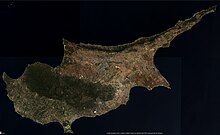Portal:Cyprus
The Cyprus Portal

Cyprus (/ˈsaɪprəs/ ), officially the Republic of Cyprus, is an island country in the eastern Mediterranean Sea. It is geographically a part of West Asia, but its cultural ties and geopolitics are overwhelmingly Southeast European. Cyprus is the third largest and third-most populous island in the Mediterranean. It is east of Greece, north of Egypt, south of Turkey, and west of Lebanon and Syria. Its capital and largest city is Nicosia. The northeast portion of the island is de facto governed by the self-declared Turkish Republic of Northern Cyprus, which like Turkey refers to the internationally recognised government of Cyprus as the Greek Cypriot Administration of Southern Cyprus (Turkish: Güney Kıbrıs Rum Yönetimi) or simply the Greek Cypriot Administration.
Cyprus was first settled by hunter-gatherers around 13,000 years ago, with farming settlements emerging a few thousand years later. During the late Bronze Age, Cyprus, known in contemporary sources as Alashiya, developed an urbanized society closely connected to the wider Mediterranean world. Cyprus experienced waves of settlement by Mycenaean Greeks at the end of the 2nd millennium BC. It was subsequently occupied by several major powers, including the empires of the Assyrians, Egyptians and Persians, from whom the island was seized in 333 BC by Alexander the Great. Subsequent rule by Ptolemaic Egypt, the Classical and Eastern Roman Empire, Arab caliphates for a short period, the French Lusignan dynasty and the Venetians was followed by over three centuries of Ottoman rule between 1571 and 1878 (de jure until 1914). Cyprus was placed under the United Kingdom's administration based on the Cyprus Convention in 1878 and was formally annexed by the UK in 1914.
The future of the island became a matter of disagreement between the two prominent ethnic communities, Greek Cypriots and Turkish Cypriots. From the 19th century onwards, the Greek Cypriot population pursued enosis, union with Greece, which became a Greek national policy in the 1950s. The Turkish Cypriot population initially advocated the continuation of the British rule, then demanded the annexation of the island to Turkey, and in the 1950s, together with Turkey, established a policy of taksim, the partition of Cyprus and the creation of a Turkish polity in the north. Following nationalist violence in the 1950s, Cyprus was granted independence in 1960. The crisis of 1963–64 brought further intercommunal violence between the two communities, displaced more than 25,000 Turkish Cypriots into enclaves and brought the end of Turkish Cypriot representation in the republic. On 15 July 1974, a coup d'état was staged by Greek Cypriot nationalists and elements of the Greek military junta. This action precipitated the Turkish invasion of Cyprus on 20 July, which led to the capture of the present-day territory of Northern Cyprus and the displacement of over 150,000 Greek Cypriots and 50,000 Turkish Cypriots. A separate Turkish Cypriot state in the north was established by unilateral declaration in 1983; the move was widely condemned by the international community, with Turkey alone recognising the new state. These events and the resulting political situation are matters of a continuing dispute. Cyprus is a major tourist destination in the Mediterranean. The country has an advanced high-income economy. The Republic of Cyprus has been a member of the Commonwealth since 1961 and was a founding member of the Non-Aligned Movement until it joined the European Union on 1 May 2004. On 1 January 2008, Cyprus joined the eurozone. (Full article...)
Selected article -
Cyprus is an island in the Eastern Basin of the Mediterranean Sea. It is the third-largest island in the Mediterranean, after the Italian islands of Sicily and Sardinia, and the 80th-largest island in the world by area. It is located south of the Anatolian Peninsula, yet it belongs to the Cyprus Arc. Geographically, Cyprus is located in West Asia, but the country is considered a European country in political geography. Cyprus also had lengthy periods of mainly Greek and intermittent Anatolian, Levantine, Byzantine, Turkish, and Western European influence.
The island is dominated by two mountain ranges, the Troodos Mountains and the Kyrenia Mountains or Pentadaktylos, and the central plain, the Mesaoria, between them. The Troodos Mountains cover most of the southern and western portions of the island and account for roughly half its area. The narrow Kyrenia Range extends along the northern coastline. It is not as high as the Troodos Mountains, and it occupies substantially less area. The two mountain ranges run generally parallel to the Taurus Mountains on the Turkish mainland, the outlines of which are visible from northern Cyprus. Coastal lowlands, varying in width, surround the island. (Full article...)Cyprus news
No recent news
General images
Related portals
Religions in Cyprus
Countries with related heritage
Nearby countries
Things you can do
- Improve the project; WikiProject Cyprus
WikiProjects
Associated Wikimedia
The following Wikimedia Foundation sister projects provide more on this subject:
-
Commons
Free media repository -
Wikibooks
Free textbooks and manuals -
Wikidata
Free knowledge base -
Wikinews
Free-content news -
Wikiquote
Collection of quotations -
Wikisource
Free-content library -
Wikiversity
Free learning tools -
Wikivoyage
Free travel guide -
Wiktionary
Dictionary and thesaurus


































![Image 34Cypri insvla nova descript 1573, Ioannes á Deutecum f[ecit]. Map of Cyprus newly drawn by Johannes van Deutecom, 1573. (from Cyprus)](http://upload.wikimedia.org/wikipedia/commons/thumb/b/b7/Atlas_Ortelius_KB_PPN369376781-073av-073br.jpg/120px-Atlas_Ortelius_KB_PPN369376781-073av-073br.jpg)
















































